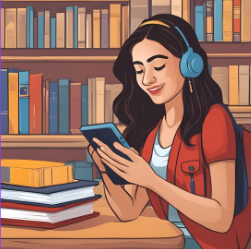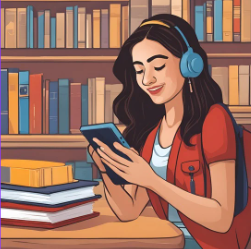
As an Early French Immersion teacher, I am interested in investigating the shortcomings of language learning and figuring out how to improve the experience of French Language learning. Canadian French Language learning and instruction is at a crossroads, as multiple factors affect the current and future success of the system.
- There is a shortage of French Teachers, especially in remote/underserved areas
- The population of Canadians learning French is more diverse than ever, and our system was originally designed to teach French to anglophones within the traditional education system
- Mobile and digital resources are more diverse and available than ever, but they are scattered, inconsistent and seldom align with curriculum or structured language learning models.
My presentation (found HERE) imagines an App called VoxFranco. This would be a platform for truly mobile language learning, specific (for now) to Canadians learning French as a second/additional language. It would incorporate collaborative platforms, AI Chatbots and learning tools, conventional direct lessons and workshops, professional learning, videos, user generated content/media and other language learning tools. It would all be customizable by the individual learner or educator, with the goal of creating a truly individualized, responsive learning platform where the learner is not tied to a particular teacher, location, school, or approach.
I welcome your feedback, and look forward to exploring your A3 projects in more detail.

Hello Sam,
You definitely show some inspired thinking towards tackling this issue in Canada. Myself included lacked a lot of the impetus to learn French when growing up in Alberta, and the deficits in the education system to sufficiently equip staffing with strong French Immersion teachers was and still is an issue.
Some of the sentiments brought up by our colleagues resonate with me though. The “how” of this app in targetting personalized AI learning is a key question. Similarly to Olivia’s project, I would suggest a thematic look into personalizing learning in a way that is similar to personalized ads when it comes to using AI, but the algorithms are skewed towards helpingn an individual recall, retain, and learn new vocabulary. I often find myself forgetting the same terms repeatedly, struggling to recall, but would appreciate the assistance of AI to be like a digital interface that ‘mirrors’ my neural network to help recall information that I had once put effort into retaining.
Otherwise, great forecasting and I hope to see an app like this in the future!
Hi Sam,
I was really engaged in your idea and the problem you are seeking to address. It struck me that you are correct, that French language learning in Canada is heavily oriented towards anglophone. Very interesting! So the idea of creating something that reorients French language learning to service an array of linguistic and cultural backgrounds is an excellent one.
As I worked through your presentation, I followed along and was approvingly engaged. I did, however, keep asking inside my head, “yeah, but HOW?”. At the end of the day, HOW will the app provide lessons that will actually be diverse, will actually be individualized? What will that look like?
So yes, I truly think this is valuable and excellent – I just found myself wanting to dig into the nitty-gritty of what and how with you, ha. And that’s a good thing!
Thanks again,
Steve
Hi Sam,
This was an interesting OER for me as I’ve had a varied range of experiences as a language student throughout my life. When I was in school, I was in small town southern Ontario, which was a predominantly English speaking area with a variety of heritage languages (such as Polish). French had little direct relevance there, and the combination of lackluster teachers and a divisive political climate (the Meech Lake Accord) gave me a fairly negative view of studying French. Later as an adult, my perceptions changed: the possibilities of government jobs were a definite prosaic factor while I was living in Ottawa, and my experiences travelling and living abroad made me open to the benefits of speaking any additional language.
From both perspectives, I see considerable value in the tool you are proposing. Additional content and methods of interaction would have been a welcome contrast to teachers I didn’t find motivating. AI chat partners also seem very powerful. Practicing with classmates of a similar level and disposition wasn’t really fulfilling, and when I made serious efforts into learning Mandarin, I experienced the legendary “silent phase” where I lacked the comfort to engage in the language using what I was able to. I could see an AI practice partner being a helpful tool to get past that stage.
While you’ve focused on the Canadian context for French, I hope that tools like yours become more commonplace. The twin factors or strong technology making these options viable, along with an increasingly globally aware and mobile population make this an ideal time to ramp up language learning.
Devon
Hi Sam,
Nice vision for a French learning app. So needed in Canada! The highlight of my French class in elementary school, to date myself, was the ridiculous telefrances ‘Anana’ https://www.youtube.com/watch?v=rBSflK1FTSY I think one of the biggest struggles learning French in most parts of Canada is a disconnect with anything French in the surrounding society unless you are lucky enough to live in a bilingual town near Quebec. As a child, it seems like learning math without understanding the application, it is just abstract memorization without opportunity for application. Your imagined app really hits on some needed aspects of language learning. Namely, the opportunity to connect with others! As well as connecting with community, your app also offeres opportunities to explore other classes and have the aid of chat bots. I think that would be an incredible resource to help support learners to explore their interests in French. Also being mobile, it would allow them to get in those necessary hours outside the classroom.
Is there currently anything like this that you can point your students to as a resource?
I really think this would be a good project to undertake.
Thanks for your ideas Sam.
Rich
Hello Sam,
How creative! As a secondary educator, you nailed it. Our French curriculum is still very traditional and some may deem it as unsuccessful because our domestic composition is no longer anglophone speakers. In fact, from all heritages and understanding of what Canadian identity look like. I feel that French now needs to encompass some sort of geographical preface and background pertaining the historical significance of practising French in Canada. As an Anglophone, who had enjoyed learning French from grade 3 to first year of university, I have to say gives me hope to revive our Francophone abilities in Canada. VoxFranco is a great starter app for national language revitalization as it highlights three main components that I appreciate, supportive and adaptive to new Canadians, diverse learners, and remote learners.
Great vision and a meaningful approach to language acquisition!